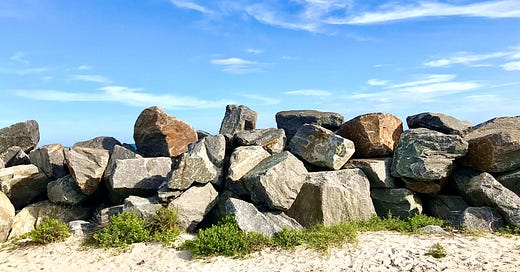Photo by Jessi Ram: https://www.pexels.com/photo/sunlit-stones-on-ground-17563423/
A time to throw stones and a time to gather stones;
A time to embrace and a time to shun embracing. - Ecclesiastes 3:5
I have to admit that I have been waiting a few days to write about this because the idea of throwing stones and gathering stones is just not something that we, in modern America, do all that much. At least not in our everyday lives.
So, even though I generally do not read commentaries when I am writing about these things, today I read a few commentaries about these verses hoping to gain information about the time period in which this was written. Usually, I just let scripture explain scripture.
David Guzik writes concerning throwing stones…
A time to cast away stones: In the ancient world they commonly scattered stones on an enemies’ land to hinder farming.
v. The poetic quality of the list shows that even the tragic, dark aspects of life can be artfully — and powerfully — presented.
Chuck Smith writes about chapter 3 of Ecclesiastes and sums it up as a chapter that has to do with the monotony of life. So I didn’t find what he has to say very helpful.
Matthew Henry said this concerning verse 5…
A time to cast away stones, by breaking down and demolishing fortifications, when God gives peace in the borders, and there is no more occasion for them; but there is a time to gather stones together, for the making of strong-holds,
So it appears that in context, throwing stones, could just be something that was done to cause some type of damage to someone or something. The only modern day context I see in throwing stones is that if I were to go to a lake or a pond, I may pick up a stone and throw it into the water. However, I also know that adherents to Islam often use stoning as way to kill someone.
In the New Testament the most popular verse about casting stones is in John 8:7 …
But when they persisted in asking Him, He straightened up, and said to them, “He who is without sin among you, let him be the first to throw a stone at her.”
So clearly we know that in that culture throwing stones is generally not associated with anything good. Casting stones then was similar to today in Islam where they stone people to death. We also know that Stephen was stoned to death in the New Testament.
The Hebrew for “to throw stones” is actually translated very well. It means just that, to cast away or to throw and literally the stone can be large or small.
The ending phrase to gather stones is also translated well. It literally means what it says.
I find it interesting that there really is no commentary on gathering stones, at least not in the few places I read before. However, it stands to reason that the gathering of stones probably has to do with rebuilding things that were destroyed and/or it may also indicate a preparation for being ready to have stones to throw when needed.
Clearly, in context, the stones to be thrown or to be gathered are actual literal stones. I think for us, we may want to consider this in light of how we can look at this figuratively.
For me, I may not pick up a physical stone to throw at someone, but I have definitely thrown stones with my words and my attitudes, and actions. I am totally guilty of this. In fact, this morning as I was praying for people I love and thinking through my ministry, I felt grieved and convicted of how I have approached certain issues in the past. At the time, I didn’t know any better. Today, I do and so I know that I can’t throw stones about these issues anymore.
In like manner, I think it’s easy to consider this regarding gathering stones. I see that as a way to pick up the pieces of what may be left after throwing stones. I realize the fortification of building houses or fortresses with stones in the Bible, but I also see how when we gather things to ourselves, it can also be protective.
For example, when we “gather stones” of information about someone and we seek to understand where they are coming from, that may build a greater understanding, which then fosters protection in the relationship.
I also see how we can gather things to make something new. I am, by nature, a gatherer. I gather information, almost to a fault, in order to understand people and situations.
What about you? Are you a stone thrower or a gatherer?





